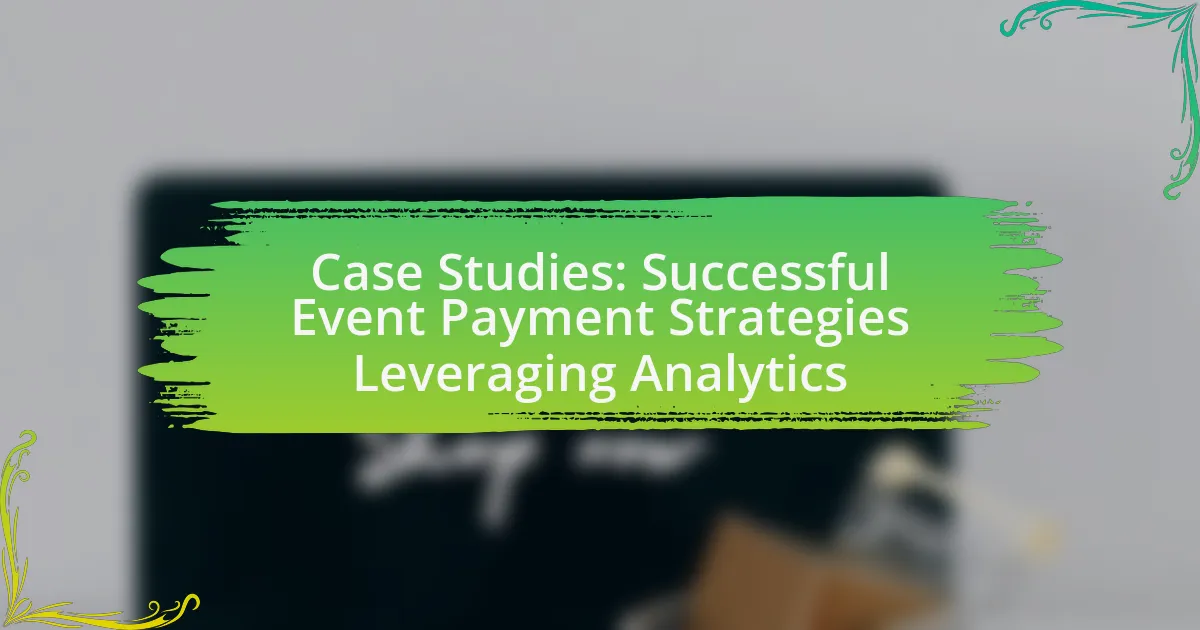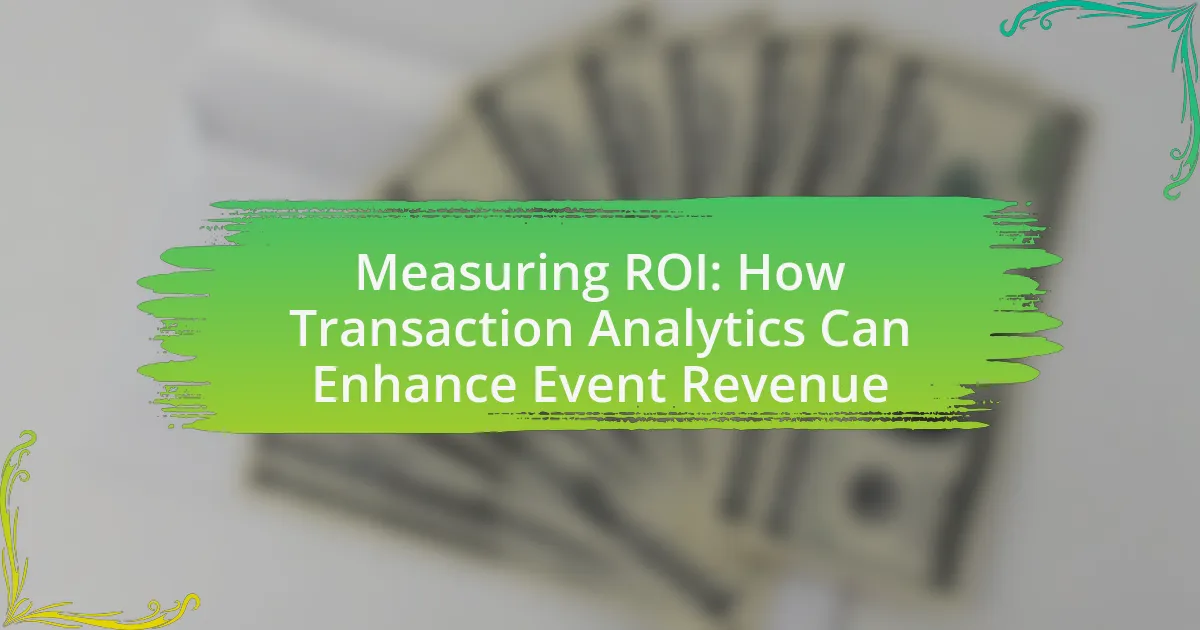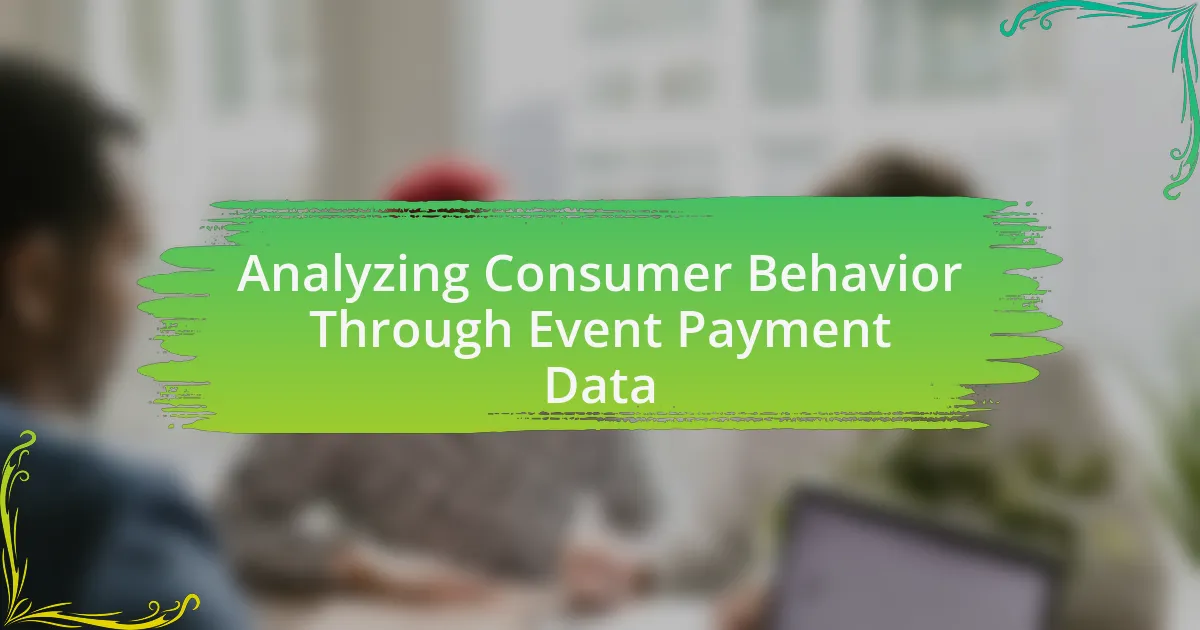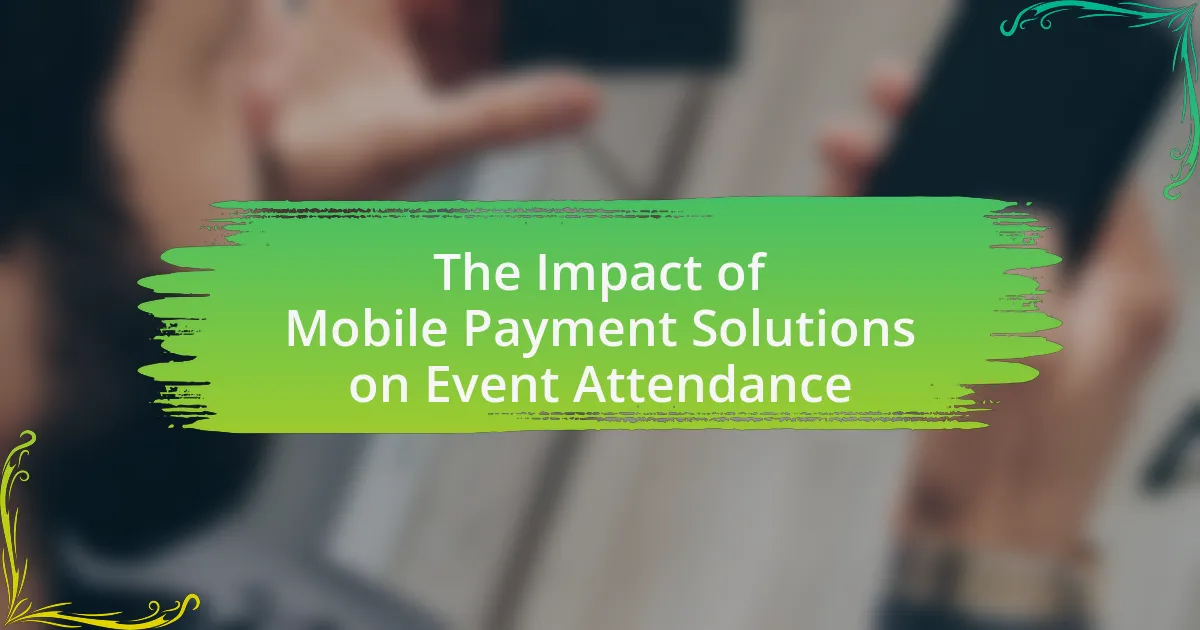Integrating payment gateways for seamless event transactions is a critical process that connects various payment systems to facilitate smooth financial transactions during events. This integration allows event organizers to accept multiple payment methods, enhancing user experience and meeting consumer preferences for digital payments. The article outlines how payment gateways function, their key components, and the security measures they employ to protect sensitive information. Additionally, it discusses the advantages of integration, challenges faced, regulatory considerations, and best practices for effective implementation, providing a comprehensive overview of the importance and impact of payment gateways in the event management sector.
What is Integrating Payment Gateways for Seamless Event Transactions?

Integrating payment gateways for seamless event transactions refers to the process of connecting various payment processing systems to facilitate smooth financial transactions during events. This integration allows event organizers to accept multiple payment methods, such as credit cards, digital wallets, and bank transfers, ensuring a streamlined purchasing experience for attendees. According to a report by Statista, 70% of consumers prefer using digital payment methods, highlighting the importance of integrating these gateways to meet customer expectations and enhance transaction efficiency.
How do payment gateways function in the context of event transactions?
Payment gateways function in the context of event transactions by securely processing payment information between the customer and the merchant. When a customer purchases a ticket for an event, the payment gateway encrypts the transaction details, ensuring sensitive information like credit card numbers is protected. This encrypted data is then transmitted to the payment processor, which verifies the transaction with the customer’s bank. Once approved, the payment gateway communicates the confirmation back to the merchant, allowing the event organizer to finalize the ticket purchase. According to a report by Statista, the global payment gateway market is projected to reach $7.6 billion by 2024, highlighting the increasing reliance on these systems for secure transactions in various sectors, including events.
What are the key components of a payment gateway?
The key components of a payment gateway include the payment processor, merchant account, payment gateway software, and security features. The payment processor handles the transaction between the customer’s bank and the merchant’s bank, ensuring funds are transferred securely. A merchant account is a type of bank account that allows businesses to accept payments, while the payment gateway software facilitates the online transaction process by encrypting sensitive information. Security features, such as SSL certificates and PCI compliance, protect customer data during transactions, ensuring trust and safety in the payment process.
How do payment gateways ensure transaction security?
Payment gateways ensure transaction security through multiple layers of encryption and authentication protocols. They utilize Secure Socket Layer (SSL) encryption to protect sensitive data during transmission, ensuring that information such as credit card numbers and personal details are securely encrypted before being sent over the internet. Additionally, payment gateways implement tokenization, which replaces sensitive card information with a unique identifier or token, further safeguarding data from potential breaches.
Moreover, they adhere to the Payment Card Industry Data Security Standard (PCI DSS), which sets stringent security requirements for organizations that handle card payments. Compliance with PCI DSS ensures that payment gateways maintain a secure environment, reducing the risk of fraud and data theft. These measures collectively create a robust security framework that protects both merchants and consumers during online transactions.
What are the advantages of integrating payment gateways for events?
Integrating payment gateways for events streamlines the transaction process, enhancing efficiency and user experience. This integration allows for secure, real-time processing of payments, reducing the likelihood of errors and fraud. According to a study by Statista, 70% of consumers prefer online payment options, indicating that offering diverse payment methods can increase ticket sales and customer satisfaction. Furthermore, payment gateways provide detailed transaction records, aiding in financial tracking and reporting, which is crucial for event organizers.
How do payment gateways enhance the user experience for event attendees?
Payment gateways enhance the user experience for event attendees by providing secure, efficient, and convenient transaction processes. They streamline the payment process, allowing attendees to complete purchases quickly without unnecessary delays, which is crucial during high-demand ticket sales. Additionally, payment gateways support multiple payment methods, catering to diverse attendee preferences and increasing the likelihood of successful transactions. According to a study by Statista, 60% of consumers prefer using digital wallets for online purchases, highlighting the importance of offering various payment options. Furthermore, the integration of payment gateways often includes features like real-time transaction tracking and instant confirmation, which improve transparency and reduce anxiety for attendees regarding their purchases.
What cost savings can be achieved through payment gateway integration?
Payment gateway integration can achieve significant cost savings by reducing transaction fees, minimizing manual processing costs, and decreasing chargeback rates. By utilizing a payment gateway, businesses can often negotiate lower transaction fees compared to traditional payment methods, leading to direct savings on each transaction. Additionally, automation of payment processing reduces the need for manual intervention, which lowers labor costs and the potential for human error. Furthermore, effective payment gateways often include fraud detection tools that can help decrease chargeback rates, which can be costly for businesses. According to a study by the Electronic Payments Association, businesses that integrated payment gateways reported up to a 30% reduction in overall payment processing costs.
What challenges are associated with integrating payment gateways for events?

Integrating payment gateways for events presents several challenges, including technical compatibility, security concerns, and user experience issues. Technical compatibility arises when the payment gateway does not seamlessly integrate with existing event management software, leading to potential disruptions in transaction processing. Security concerns are paramount, as event organizers must ensure that sensitive payment information is protected against breaches, which can damage reputation and lead to financial losses. Additionally, user experience issues can occur if the payment process is not intuitive, resulting in abandoned transactions and frustrated customers. These challenges highlight the complexity of ensuring a smooth and secure payment process for event attendees.
How can technical issues impact payment gateway integration?
Technical issues can significantly hinder payment gateway integration by causing transaction failures, delays, and security vulnerabilities. For instance, if there are bugs in the code or compatibility issues with the existing system, transactions may not process correctly, leading to lost sales opportunities. Additionally, inadequate error handling can result in poor user experiences, where customers may abandon their purchases due to frustration. According to a study by the Baymard Institute, 18% of users abandon their carts due to technical errors during checkout. Furthermore, security flaws can expose sensitive customer data, risking compliance with regulations such as PCI DSS, which mandates secure handling of payment information. Thus, addressing technical issues is crucial for ensuring a smooth and secure payment gateway integration.
What are common technical challenges faced during integration?
Common technical challenges faced during integration include data format discrepancies, API compatibility issues, and security vulnerabilities. Data format discrepancies arise when different systems use varying data structures, making it difficult to exchange information seamlessly. API compatibility issues occur when the payment gateway’s API does not align with the existing system’s requirements, leading to integration failures. Security vulnerabilities can emerge during the integration process, particularly if sensitive payment information is not adequately protected, increasing the risk of data breaches. These challenges are critical to address to ensure a smooth and secure integration of payment gateways for event transactions.
How can these technical challenges be mitigated?
Technical challenges in integrating payment gateways can be mitigated by implementing robust API documentation and utilizing standardized protocols. Clear API documentation ensures that developers understand the integration process, reducing errors and improving efficiency. Standardized protocols, such as REST or SOAP, facilitate smoother communication between systems, minimizing compatibility issues. Additionally, employing thorough testing environments allows for the identification and resolution of potential issues before deployment, further enhancing the reliability of the integration.
What regulatory considerations must be addressed when integrating payment gateways?
When integrating payment gateways, businesses must address regulatory considerations such as compliance with Payment Card Industry Data Security Standards (PCI DSS), anti-money laundering (AML) regulations, and data protection laws like the General Data Protection Regulation (GDPR). Compliance with PCI DSS is essential to ensure the security of cardholder data, as failure to meet these standards can result in significant fines and loss of customer trust. Additionally, AML regulations require businesses to implement measures to detect and report suspicious transactions, which is crucial for preventing fraud and financial crime. Data protection laws mandate that businesses handle personal data responsibly, ensuring transparency and user consent in data collection and processing. These regulatory frameworks are vital for maintaining legal compliance and safeguarding customer information in payment processing.
How do data protection laws affect payment gateway integration?
Data protection laws significantly impact payment gateway integration by imposing strict requirements on how personal and financial data is collected, processed, and stored. Compliance with regulations such as the General Data Protection Regulation (GDPR) in Europe mandates that payment gateways implement robust security measures, obtain explicit consent from users for data processing, and ensure transparency regarding data usage. For instance, under GDPR, businesses must inform customers about their data rights and provide mechanisms for data access and deletion, which directly influences the design and functionality of payment gateway systems. Failure to comply with these laws can result in substantial fines and legal repercussions, emphasizing the necessity for payment gateways to prioritize data protection in their integration processes.
What compliance standards should be followed for secure transactions?
The compliance standards that should be followed for secure transactions include the Payment Card Industry Data Security Standard (PCI DSS), General Data Protection Regulation (GDPR), and the Electronic Fund Transfer Act (EFTA). PCI DSS outlines security measures for organizations that handle credit card information, ensuring data protection and reducing fraud risk. GDPR mandates the protection of personal data for individuals within the European Union, emphasizing consent and data privacy. EFTA governs electronic payments, providing consumer protections against unauthorized transactions. Adhering to these standards is essential for maintaining security and trust in payment processing.
How can event organizers effectively implement payment gateways?

Event organizers can effectively implement payment gateways by selecting a reliable provider, integrating the gateway into their event management system, and ensuring compliance with security standards. Choosing a reputable payment gateway, such as PayPal or Stripe, allows for secure transactions and a user-friendly experience. Integration involves using APIs or plugins that connect the payment gateway to the event registration platform, facilitating seamless transactions. Additionally, adhering to PCI DSS (Payment Card Industry Data Security Standard) ensures that sensitive payment information is protected, which is crucial for maintaining customer trust and preventing data breaches.
What steps should be taken to choose the right payment gateway?
To choose the right payment gateway, first assess your business needs, including transaction volume and types of payments accepted. Next, compare fees associated with each gateway, such as transaction fees, monthly fees, and setup costs, as these can significantly impact your overall expenses. Evaluate the security features offered by the gateways, ensuring they comply with PCI DSS standards to protect customer data. Additionally, consider the integration capabilities with your existing systems, as a seamless connection can enhance operational efficiency. Finally, review customer support options, as reliable assistance can be crucial during technical issues. These steps ensure that the selected payment gateway aligns with your business requirements and provides a secure and efficient transaction process.
What factors should be considered when evaluating payment gateway options?
When evaluating payment gateway options, key factors include transaction fees, security features, integration capabilities, and customer support. Transaction fees can significantly impact overall costs; for instance, some gateways charge a percentage per transaction while others have flat fees. Security features are crucial, as gateways must comply with PCI DSS standards to protect sensitive payment information. Integration capabilities determine how easily the gateway can connect with existing systems, affecting operational efficiency. Lastly, reliable customer support is essential for resolving issues quickly, ensuring smooth transaction processes.
How can event organizers assess the reliability of a payment gateway provider?
Event organizers can assess the reliability of a payment gateway provider by evaluating its security features, transaction success rates, customer support, and user reviews. Security features such as PCI compliance and encryption protocols are critical, as they protect sensitive payment information. Transaction success rates indicate the provider’s efficiency in processing payments, with a higher percentage reflecting reliability. Additionally, responsive customer support ensures that any issues can be quickly resolved, which is vital during events. User reviews and testimonials provide insights into the experiences of other organizers, highlighting the provider’s performance and trustworthiness.
What best practices should be followed during the integration process?
During the integration process of payment gateways for seamless event transactions, it is essential to follow best practices such as thorough planning, robust testing, and ensuring compliance with security standards. Thorough planning involves defining clear objectives, understanding user requirements, and selecting the appropriate payment gateway that aligns with the event’s needs. Robust testing is crucial to identify and resolve any issues before going live, which includes testing various payment scenarios and ensuring the user experience is smooth. Compliance with security standards, such as PCI DSS, protects sensitive payment information and builds trust with users. These practices are validated by industry standards that emphasize the importance of security and user experience in payment processing.
How can testing and feedback improve the integration process?
Testing and feedback enhance the integration process by identifying issues early and ensuring that the payment gateway functions as intended. Through systematic testing, developers can uncover bugs, compatibility problems, and user experience flaws before the system goes live. Feedback from users and stakeholders provides insights into real-world usage, allowing for adjustments that improve functionality and satisfaction. For instance, a study by the International Journal of Information Management found that iterative testing and user feedback can reduce integration errors by up to 30%, demonstrating the effectiveness of these practices in refining the integration process.
What role does customer support play in successful integration?
Customer support plays a crucial role in successful integration by providing timely assistance and guidance to users during the implementation process. Effective customer support helps address technical issues, answer questions, and facilitate communication between stakeholders, which can significantly reduce downtime and enhance user satisfaction. Research indicates that organizations with strong customer support during integration experience a 30% faster implementation time and a 25% increase in user adoption rates, demonstrating the impact of responsive support on the overall success of integration efforts.
What are some common troubleshooting tips for payment gateway issues?
Common troubleshooting tips for payment gateway issues include checking internet connectivity, verifying payment gateway credentials, ensuring the payment gateway is operational, and reviewing transaction logs for errors. Internet connectivity is crucial as disruptions can prevent transactions from processing. Verifying credentials ensures that the integration is correctly set up, as incorrect API keys or account details can lead to failures. Payment gateways may experience downtime; checking their status can confirm if the issue is on their end. Lastly, reviewing transaction logs can provide insights into specific errors, allowing for targeted fixes.
How can event organizers quickly resolve transaction failures?
Event organizers can quickly resolve transaction failures by implementing real-time monitoring systems that alert them to issues as they arise. These systems enable organizers to identify the root cause of the failure, whether it be a payment gateway issue, insufficient funds, or incorrect payment details. By having access to transaction logs and error codes, organizers can swiftly communicate with payment processors to rectify the problem. Additionally, offering multiple payment options can reduce the likelihood of transaction failures, as it provides alternatives for customers facing issues with a specific method.
What resources are available for ongoing support and troubleshooting?
For ongoing support and troubleshooting in integrating payment gateways for seamless event transactions, resources include official documentation from payment gateway providers, community forums, and customer support services. Official documentation typically offers detailed guides, FAQs, and troubleshooting steps specific to the payment gateway being used, ensuring users have access to accurate and relevant information. Community forums, such as those on platforms like Stack Overflow or GitHub, allow users to share experiences and solutions, fostering a collaborative environment for problem-solving. Additionally, customer support services provided by payment gateway companies offer direct assistance for specific issues, often available through chat, email, or phone, ensuring users can receive timely help when needed.






